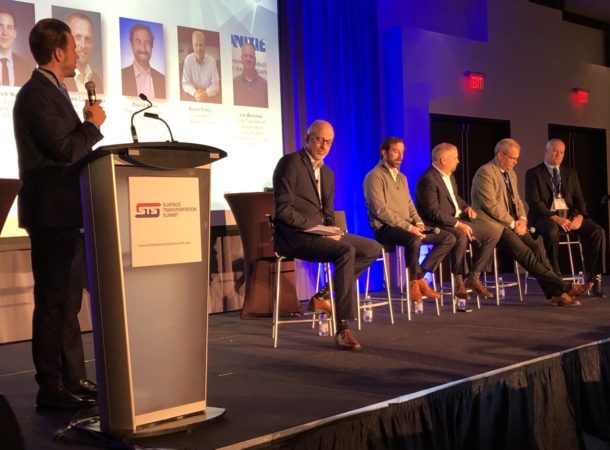Slow growth, but no recession ahead: Economist
MISSISSAUGA, Ont. – Global trade is contracting for the first time since the 2009 financial crisis, but a recession isn’t imminent.
Josh Nye, senior economist with RBC, told a packed house at the Surface Transportation Summit Oct. 16, that the services sector is holding up well. He also noted trade talks between the U.S. and China are now moving in a more promising direction. While Nye said there is a “heightened risk” of recession, he added “our expectation at this point is that we will see continued slow growth in the number of advanced economies we track, but not an outright recession.”
He compared the current and coming economic environment to that of 2015-2016, when oil prices wrought some damage on the Canadian economy without plunging it into recession. But, he cautioned, “there’s more room to surprise on the downside than the upside.”
Expect the U.S. and Canadian economies to grow at a sluggish pace of a little less than 2%, Nye said.
David Ross, managing director of global transportation and logistics with Stifel, noted collaboration between shippers and truckers will be the key to unlocking efficiencies and adding productivity. He noted logistics costs as a percentage of GDP have been increasing, largely due to road congestion.
“More trucks are required to move the same amount of freight every year, and I don’t see a solution to this long-term,” he said.
Ross said capacity came online during a strong 2018, right as freight demand began to diminish. Looking at rail car loadings, Ross said the economy is already experiencing a mild freight recession. Tariffs could make the situation worse, he added.
“Tariffs are just taxes, and taxes are bad for freight demand,” said Ross.
Stifel expects retail sales to remain strong through the rest of the year, due to strong consumer spending. Next year, however, could be more difficult, he predicted, especially for truckload carriers. An injection of truckload capacity has caused downward pressure on spot market pricing, which is now leaking into contract pricing, Ross said.
“Most shippers we talk to today are getting reductions in contract rates from carriers,” he said, adding many of those carriers saw 18-24% rate increases last year. “They’re having to walk some of that back.”
However, Stifel anticipates rates will rise modestly next year for truckload carriers, due to an increase in operating costs. Ross said rate increases of 2-3% could be viewed as a win for both shippers and carriers.
“The carriers that took advantage of shippers in 2018 are paying the most for it in 2019,” Ross said.
Scott Tilley, president of Tandet Group, acknowledged business is softening, but still steady. The bulk sector is a leading indicator of the economy and overall freight demand, he noted.
“When we have softness in that market, there is a softness that eventually percolates into the marketplace,” he said. “It reduces the need for van carriers and flatdeck carriers as well. We have seen a softness this year, but not a drop-off. The activity level from most of our customers has come off a little bit. I’d classify it as good to very good, as opposed to last year, which was just crazy.”
Jim Bonsteel, vice-president of transportation, customs and compliance with Anixter, said carriers who took advantage of their shippers last year could be paying the price today.
“I thought it was very interesting how quickly the market changed,” Bonsteel said. “The market in 2018 clearly was a carrier market. In 2019, it shifted very quickly to be a shipper market. Watch how you treat your shippers. Make sure you treat them as partners. If you haven’t treated shippers well, they will be in the driver’s seat of reviewing if they continue doing business with you.”
Tilley said Tandet did just that.
“The rates need to be fair,” he said. “Those who took too much advantage last year are feeling it a bit more this year. We took the philosophy of, the pendulum is coming back and we need to find fairness and maintain fairness.”
Looking to 2020, Tilley said the economy and insurance costs are two concerns. He worries negative discussions about the economy could become self-fulfilling, and he warned that the insurance industry is in the midst of a transformation.
“Only those that have the best safety records are going to have (insurance) rates that are reasonable,” he said.

Have your say
This is a moderated forum. Comments will no longer be published unless they are accompanied by a first and last name and a verifiable email address. (Today's Trucking will not publish or share the email address.) Profane language and content deemed to be libelous, racist, or threatening in nature will not be published under any circumstances.
Reading your headline “Slow growth, but no recession ahead: Economist” I can’t help but wonder where you got your figures from? In the west you wont find more than 1 or 2 companies saying they are remotely busy (probably because they are undercutting). If the east is busy its just because of the government handouts by the billions! Definitely a recession in the west.